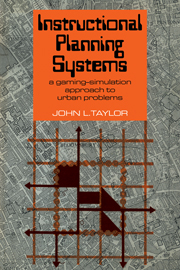Book contents
- Frontmatter
- Contents
- List of figures, tables and forms
- Acknowledgements
- 1 Point of departure
- 2 The basis for discussion
- 3 The genesis of an approach
- 4 Selected planning developments
- 5 Impact, pitfalls and pay-offs
- 6 A gaming-simulation rationale
- 7 Simulation in practice
- 8 The way ahead
- Appendices
- Bibliography
- Index
3 - The genesis of an approach
Published online by Cambridge University Press: 07 May 2010
- Frontmatter
- Contents
- List of figures, tables and forms
- Acknowledgements
- 1 Point of departure
- 2 The basis for discussion
- 3 The genesis of an approach
- 4 Selected planning developments
- 5 Impact, pitfalls and pay-offs
- 6 A gaming-simulation rationale
- 7 Simulation in practice
- 8 The way ahead
- Appendices
- Bibliography
- Index
Summary
This section traces the genesis of instructional simulation systems with specific reference to the development of planning games. A direct linear progression of events which precede and underpin the advent of this form of simulation is discernible but their inter-relationship and the effect of some concurrent activities is highly debatable. More specifically the roots of the urban development gaming-simulation are examined with reference to three streams of endeavour involving: military innovators, social scientists, and a small, yet significant, interdisciplinary group of academic theorists.
WAR GAMING
Gaming-simulation procedures have a venerable pedigree in the form of war games. But, despite their age and popularity as well as the fact that these military games might be regarded as the earliest known form of instructional simulation, there are few broad surveys of the field or treatises on their interrelationship with the rapidly developing area of social science simulation.
Perhaps the most recent and certainly one of the most readable accounts of the origins and development of war gaming has been provided by Wilson (1968) in his book The Bomb and the Computer. Despite its informal and circumscribed title this work is a succinct and comprehensive account of the military commitment to games. Other useful overviews of the field have been presented during the last twenty years by, amongst others: Young (1956, 1957 and 1959), Thomas (1957) and Cohen and Rhenman (1961).
- Type
- Chapter
- Information
- Instructional Planning SystemsA Gaming-Simulation Approach to Urban Problems, pp. 22 - 32Publisher: Cambridge University PressPrint publication year: 1971



